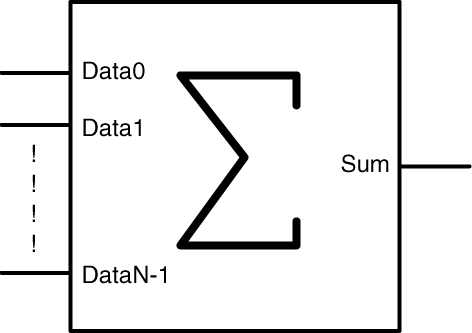
Parameterized word length and number of input buses
DADDA tree architecture with optional Final Adder
Optional pipeline for implementation with Final Adder
Behavioral simulation model in VHDL and Verilog
SX, SX-A, eX, 500K, PA, Axcelerator, ProASIC3/E, Fusion
The Array-Adder implements a Sum-Function over an array of buses:
Sum = [Summation(Data(i))] where i = 0 to Size-1
In applications where designers have to add more than two operands at a time “Carry-Save- Techniques” might be used to build the final Sum. SmartGen makes these techniques available through the Array-Adder core, which is using a Dadda tree algorithm. Usually this algorithm is more compact and faster than using Adder trees consisting of multiple 2-operand adders, especially if the number of operands gets large and/or for large word width.
An example could be the FIR-filter architecture using a “distributed arithmetic” as described in the Application Note from September 1997 Designing FIR Filters with Actel FPGAs. This architecture generates a large number of partial products, which need to be summed. Summing them in an Adder-Tree would both be slow and area-expensive. At the time of writing this document, synthesis tools did not infer Multiple-Operand-Adders. Therefore making use of the Array-Adder in those types of applications might result in a significant gain in both speed and area.
The Array Adder comes with or without Final Adder. The version with Final Adder allows SmartGen to instantiate a pipeline stage between the Dadda-tree and the Final Adder. The output bitwidth for Sum can be calculated using this formula:
OUTWIDTH = log2((m*exp2(n)-1)+1) <= n + log2(m)
The version without Final Adder has two output ports: SumA and SumB, which added together will provide the Final Result. It is
SumA_Width <= SumB_Width <= OUTWIDTH
The differences are at most one bit. This variation of the Array-Adder is particularly useful for an application that would cascade the Array-Adder. In that case only the last stage would need a Final Adder to build the result.
|
Port Description |
|
Port Name |
Size |
Type |
Req/Opt |
Function |
|
Data0 |
WIDTH |
Input |
Req. |
Input Data (Operand 0) |
|
Data1 |
WIDTH |
Input |
Req. |
Input Data (Operand 1) |
|
Data2 |
WIDTH |
Input |
Req. |
Input Data (Operand 2) |
|
Datax |
WIDTH |
Input |
Opt. |
Input Data (Operand X) X>2 |
|
Sum |
OUTWIDTH |
Output |
Req. |
Sum(Data(i) to i) = 0 to SIZE-1 |
|
Clock |
1 |
Input |
Opt. |
Active High/Low Clock (if pipelined) |
|
Parameter Description |
|
Parameter |
Value |
Function | |
|
WIDTH |
width |
AX/Flash: 2-64 All others: 2-32 |
Word length Data(i) |
|
SIZE |
size |
AX/Flash: 3-64 All others: 3-32 |
Number of input buses |
|
CKL_EDGE |
RISE FALL |
|
Clock (if pipelined) |
|
Implementation Parameters |
|
Parameter |
Value |
Description |
|
LPMTYPE |
DADDA |
Generic Array-Adder category |
|
LPM_HINT |
ARRADD |
Array-Adder with Final Adder |
|
|
ARRADDP |
Pipelined Array-Adder with Final Adder |
|
|
ARRADD2 |
Array-Adder without Final Adder |
|
Parameter Rules |
|
Family |
Variation |
Parameter Rules |
|
eX |
ARRADD / ARRADDP |
WIDTH * SIZE <=870 |
|
|
ARRADD2 |
WIDTH * SIZE <= 930 |
|
SX |
ARRADD / ARADDP |
WIDTH * SIZE <=110 |
|
|
ARRADD2 |
WIDTH * SIZE <=144 |
|
Axcelerator |
ARRADD/ARRADDP |
WIDTH * SIZE <=1920 |
|
|
ARRADD2 |
WIDTH * SIZE <=1856 |
